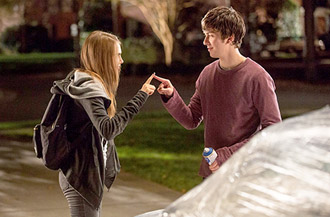|
|
Book vs. Movie: Paper TownsBy Ben GruchowAugust 10, 2015
The scene with Margo’s parents after her disappearance is actually significant on its own: we’re introduced to a detective character who provides the book’s most evocative piece of dialogue, while describing the impulse that leads a person like Margo to up and "disappear," and the impulse that leads people who admire them to cover for them. The syntax and use of slang here is a little cloying, but Green touches on something natural in the detective’s tone - a tone that feels weary and adult and perceptive, and instantly sells us on his legitimacy. This is in sharp, sharp contrast to the other big players in this sustained passage: Quentin’s own parents. They are both psychologists, which is cause for them to have the most teeth-grindingly overwritten “analytical” conversations in the history of mankind. I exaggerate, but not by a whole lot. They really are just terrible characters - not an inkling of depth, not a drop of academic credibility. Thankfully, they’re comparatively minor. The meat of the book after this is given over to a type of scavenger hunt crossed with an exploration of just how little we know the people that we have a tendency to idealize. Margo has not left totally undetected. From a poster hung in her bedroom window and facing Quentin’s, to an address written on a scrap of paper, hidden in a doorjamb, and referred to by the circling of a passage in a copy of Walt Whitman’s Leaves of Grass that Quentin retrieves from Margo’s bedroom, the clues that Margo leaves behind seem to be aimed specifically at Quentin, and attempting to put all of these clues together into a substantive narrative of where she might have gone begins to consume a large part of his spring.
|

|
|
|

|
Saturday, May 4, 2024
© 2024 Box Office Prophets, a division of One Of Us, Inc.


